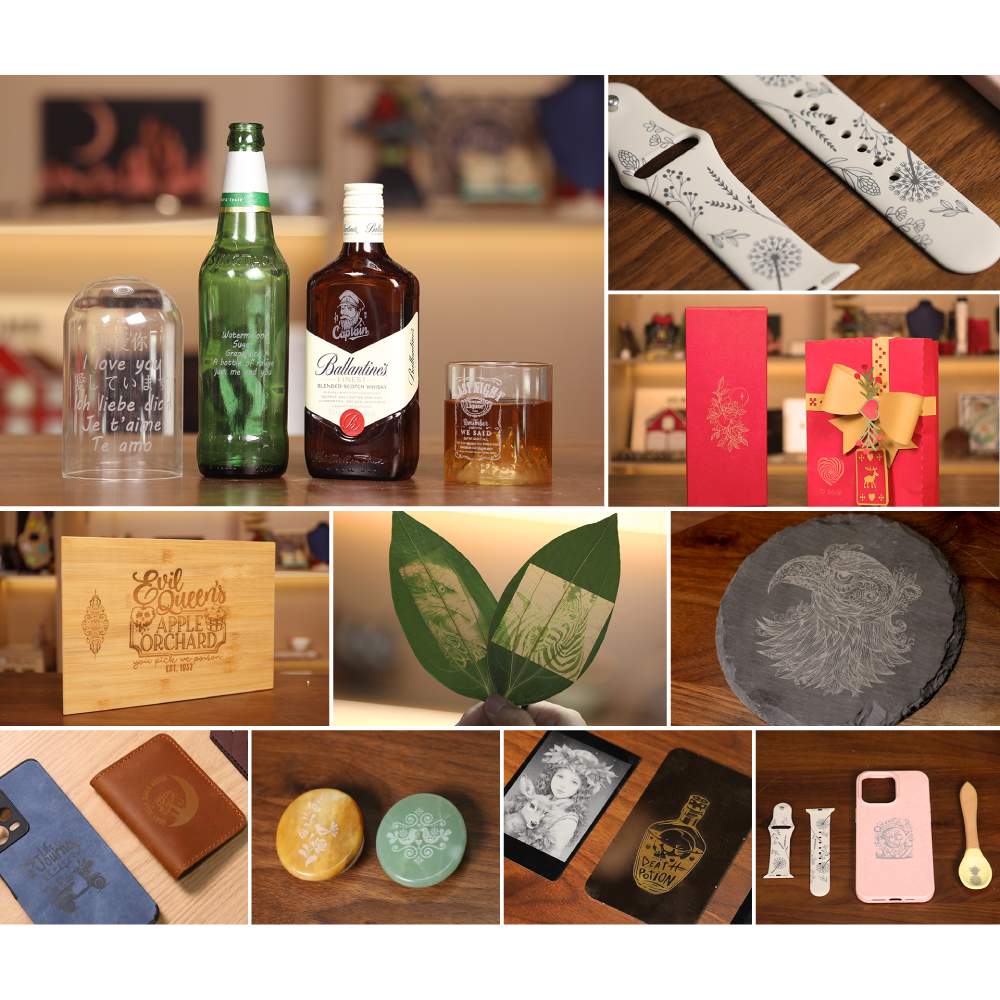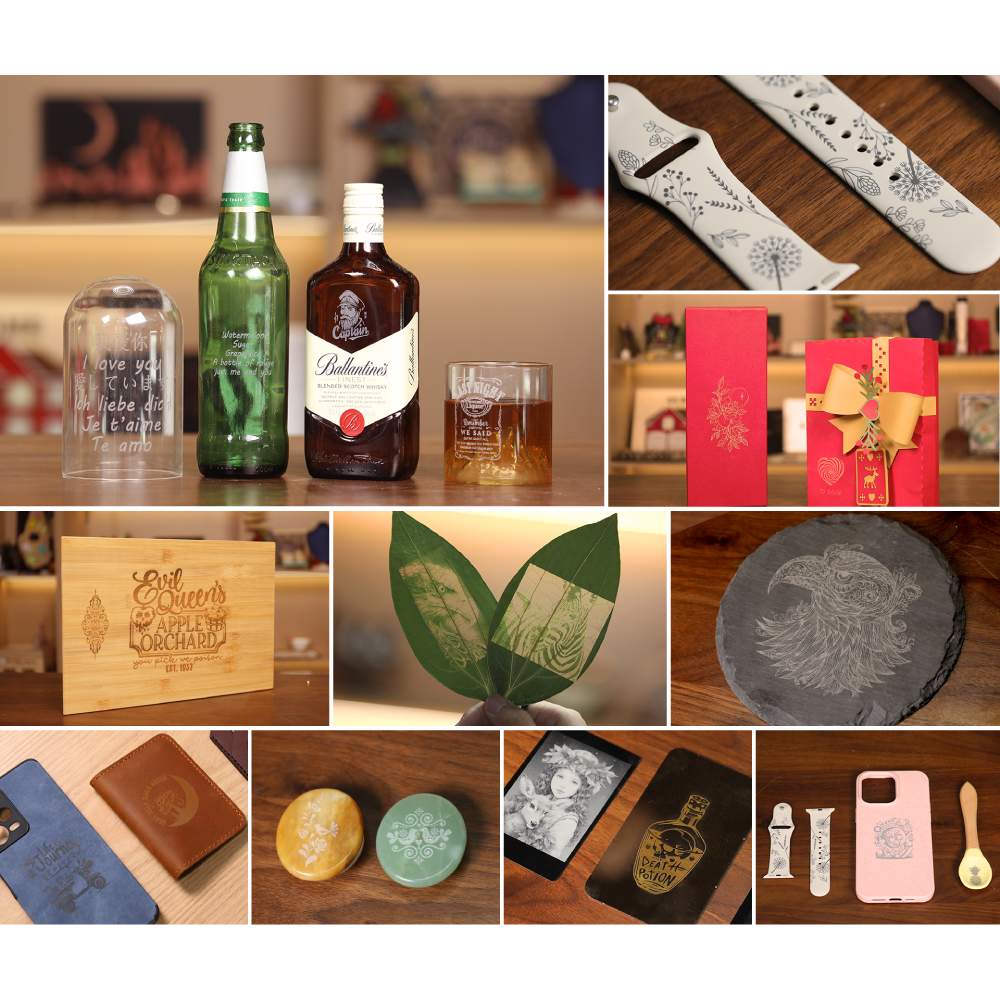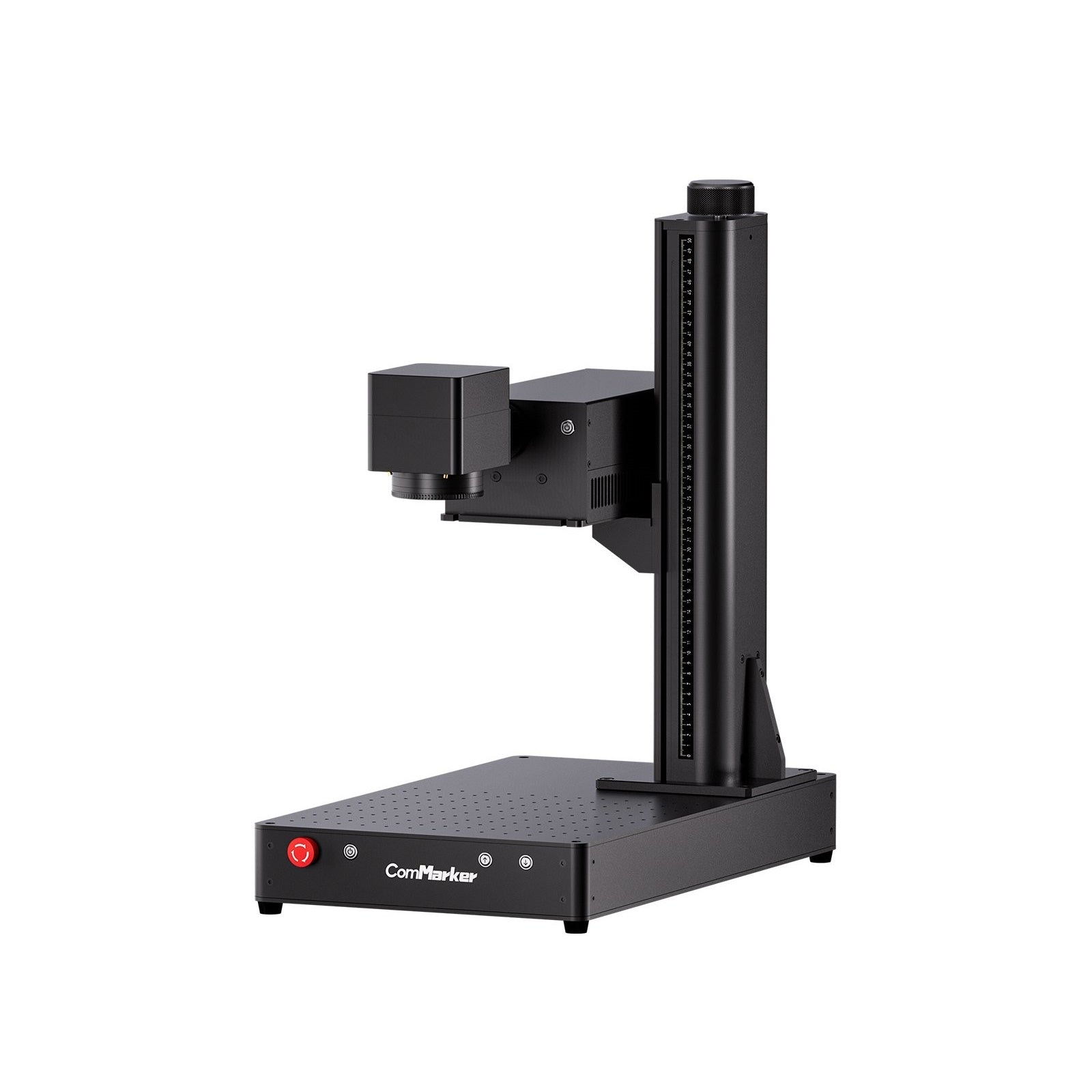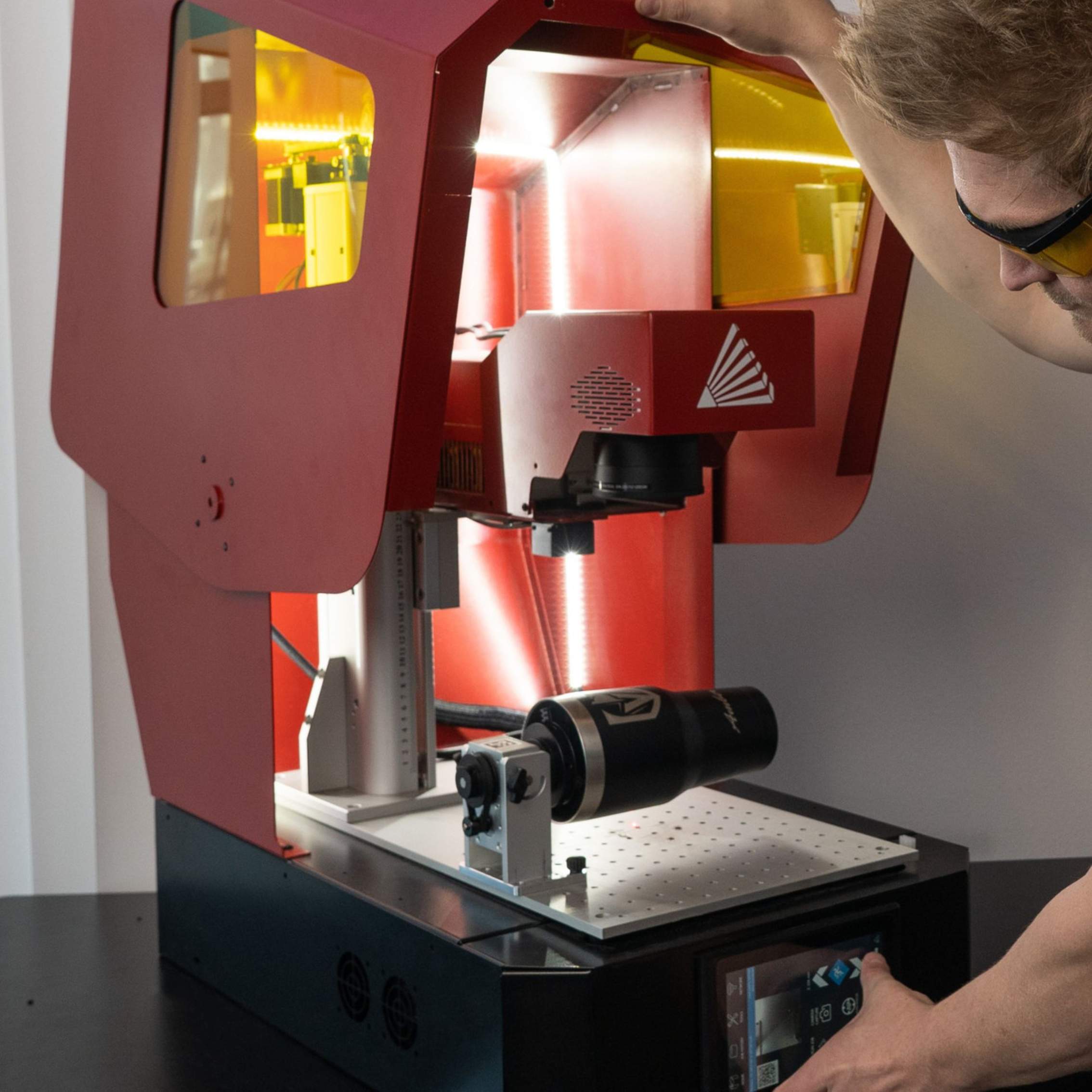
Best UV Laser Engravers: Top Picks for UV Laser Marking
UV laser engravers have gained popularity for their ability to produce high-quality markings on almost ANY material. These machines use 355nm ultraviolet light to engrave and mark surfaces with precision.
With their "cold marking" process, UV laser marking machines can work on delicate materials like glass, plastics, ceramics, and metals without causing heat damage or deformation.
Selecting the best UV laser engraver depends on your application requirements, whether you're a hobbyist, small business, or industrial user. Below, we explore three standout options that excel in precision, versatility, and performance.

Our Top Budget UV Laser: ComMarker Omni 1 UV Laser Engraver

The ComMarker Omni 1 is a perfect choice for hobbyists or small businesses looking to invest in a UV laser engraving machine that offers high-quality results at an affordable price. With a 5W 355nm UV laser, it engraves materials like metal, plastic, leather, and glass without heat distortion, ensuring intricate details and lasting durability.
Compact and efficient, this UV laser engraver features an air-cooled system that eliminates the need for complex maintenance. Its user-friendly interface is ideal for newcomers, while its powerful output ensures professional results. Despite its affordability, the Omni 1 delivers remarkable precision, meeting the needs of both novice and experienced users.
If you’re starting your engraving journey or running a small workshop, the Omni 1 provides excellent value for money while accommodating a variety of creative and commercial applications.
Key Features:
- 5W 355nm UV laser for detailed, heat-free engraving.
- Compact and portable design with minimal maintenance.
- Compatible with diverse materials like glass, metal, wood, and leather.
Our Top Commercial UV Laser: Gweike G7 UV Laser Engraver

The Gweike G7 UV Laser Engraver is tailored for businesses requiring precision, speed, and reliability in their engraving operations. Available in power options from 3W to 15W, this machine handles complex projects with ease, achieving engraving speeds up to 10,000 mm/s, making it one of the best UV laser marking machines for commercial use.
This UV laser engraving machine excels at marking various materials, including silicone, glass, leather, and paper. Its rotary engraving capability adds versatility, allowing users to engrave cylindrical objects such as bottles and tumblers. Whether you're personalizing products or creating industrial components, the G7 offers unmatched adaptability.
Additionally, the G7’s durable design and advanced features ensure long-term reliability. It’s a top pick for commercial operations looking to enhance productivity while maintaining exceptional engraving quality.
Key Features:
- High-speed engraving up to 10,000 mm/s.
- Power options from 3W to 15W for diverse applications.
- Rotary engraving capability for cylindrical items.
Our Top High-End UV Laser: FSL Muse UV Galvo Laser Engraver

The FSL Muse UV Galvo Laser Engraver represents the pinnacle of precision and innovation, making it an excellent choice for high-end and industrial applications. Powered by a 355nm pulsed UV laser, it delivers exceptional marking quality on materials such as glass, plastics, and metals. Its ability to perform subsurface engraving on glass adds a unique touch to its capabilities.
One of its standout features is AI-driven 3D scanning and engraving, which allows for flawless marking on curved surfaces. This advanced functionality makes it particularly valuable in industries like jewelry, electronics, and high-precision manufacturing, where accuracy is paramount.
Backed by a robust build and intuitive software, the Muse UV Galvo is a versatile and reliable UV laser engraver designed to handle the most intricate projects. It is ideal for professionals seeking cutting-edge technology to meet complex engraving demands.
Key Features:
- 355nm pulsed UV laser for precise and detailed markings.
- AI-driven 3D scanning and engraving for curved surfaces.
- Exceptional subsurface engraving capabilities on glass.
Understanding UV Laser Technology
UV laser technology is known for its precision in marking and engraving various materials. This section focuses on how UV lasers operate and the advantages they bring to engraving processes.
How UV Lasers Work
UV lasers emit light at wavelengths ranging from 190 to 400 nanometers. This ultraviolet light has a high energy level, allowing it to easily interact with the materials being marked. When the beam strikes the surface, it effectively removes material by breaking down the molecular bonds.
This process is known as "ablation," which leads to a clean and precise finish. UV lasers are particularly effective on sensitive materials, such as plastics and glass, which may be damaged by higher-energy lasers. As a result, machines that utilize UV laser technology are recognized as some of the best UV laser engraving machines available for intricate designs.
Advantages of UV Laser Engraving
There are several notable benefits to using a UV laser engraver. First, they provide exceptional precision, making them ideal for detailed work on various materials. This capability is crucial for industries that require high-resolution markings.
Second, UV lasers minimize heat effect, reducing the risk of warping or damaging the material. Due to their accuracy and efficiency, these engravers are popular choices among professionals.
Lastly, they offer versatility across different applications, such as in medical devices and electronics. For anyone looking for an efficient solution, investing in the best UV laser marking machine can be a significant advantage.
Applications of UV Laser Engraving
UV laser engraving is a versatile technology used across various industries and artistic endeavors. Its precision and ability to mark a wide range of materials set it apart from traditional engraving methods.
Industrial Uses
In industrial settings, the best UV laser marking machines excel at marking components for identification and tracking. They can engrave barcodes, QR codes, and serial numbers on materials such as plastics, metals, and glass.
This technology is crucial in sectors like automotive and electronics, where traceability is essential. UV lasers create permanent marks without affecting the structural integrity of the materials. This means parts remain intact while still ensuring compliance with regulations.
Common materials used include:
- Plastics: Ideal for packaging and consumer goods.
- Metals: Effective on aluminum and stainless steel.
- Glass: Used for bottles and medical devices.
The best UV laser engravers achieve high contrast marks that are durable and resistant to wear.
Artistic and Crafting Applications
Artists and crafters increasingly utilize UV laser engravers for unique creations. These UV laser engraving machines allow for intricate designs on various substrates, including wood, acrylic, and leather.
This technology enables artists to personalize items such as jewelry, trophies, and promotional materials. The accuracy of UV lasers can reproduce detailed patterns and textures, enhancing the final product's aesthetic quality.
Some popular crafting applications include:
- Personalized gifts: Custom engraving on items for special occasions.
- Home decor: Unique designs engraved on wall art or furniture.
- Small production runs: Efficiently creating limited edition items.
The sharpness and clean finish of markings are reasons why many prefer a UV laser engraver for these applications.
Factors to Consider When Choosing a UV Laser Engraver
Selecting the right UV laser engraver involves understanding key factors that affect both performance and material compatibility. Power and precision stand out as significant aspects, along with the types of materials the engraver can handle.
Power and Precision
The power of a UV laser engraving machine directly influences its engraving speed and quality. Typically, a higher wattage results in faster engraving and better detail. For example, machines ranging from 5W to 30W may offer suitable options for various projects.
Precision is also critical, especially for intricate designs. The best UV laser engravers provide high resolution, often measured in DPI (dots per inch). A machine with 1000 DPI or more will produce cleaner and sharper images.
When evaluating options, consider models that balance power and precision to match specific project needs. For detailed work on smaller materials, lower power may suffice, while larger, thicker materials may require more wattage.
Material Compatibility
Material compatibility is vital when choosing the best UV laser marking machine. Different materials respond uniquely to UV lasers. This type of engraver excels at marking and engraving on sensitive materials such as glass, acrylic, and certain plastics.
It's essential to verify whether the UV laser engraver can handle the range of materials the user plans to work with. For instance, if adding metal into the mix, ensure the machine offers the appropriate settings and power to achieve desirable results.
Users should also consider the thickness of the materials. Some UV laser engravers may only handle thin sheets, while others can effectively engrave on thicker substrates. Understanding these capabilities will help in selecting the most effective model for specific projects.
Frequently Asked Questions
What are the advantages of UV laser engraving over fiber laser engraving?
UV laser engraving has distinct advantages, including lower thermal impact on materials. This feature makes it suitable for heat-sensitive products. Additionally, it can achieve finer details due to a smaller UV laser spot size, making it a preferred choice for intricate designs and valuable items.
What materials can be effectively engraved with a UV laser?
UV laser engravers can work on a variety of materials, including plastics, glass, metals, and ceramics. The high precision and non-contact nature of these machines make them suitable for both delicate and durable surfaces.
How do the engraving speeds of UV lasers compare to those of CO2 and fiber lasers?
UV lasers generally provide faster engraving speeds than traditional CO2 lasers. While fiber lasers are also fast, UV lasers stand out when engraving premium materials. This speed advantage is crucial for businesses wanting to increase productivity. The engraving spot size for CO2 lasers is also many times larger than UV lasers.



Leave a comment